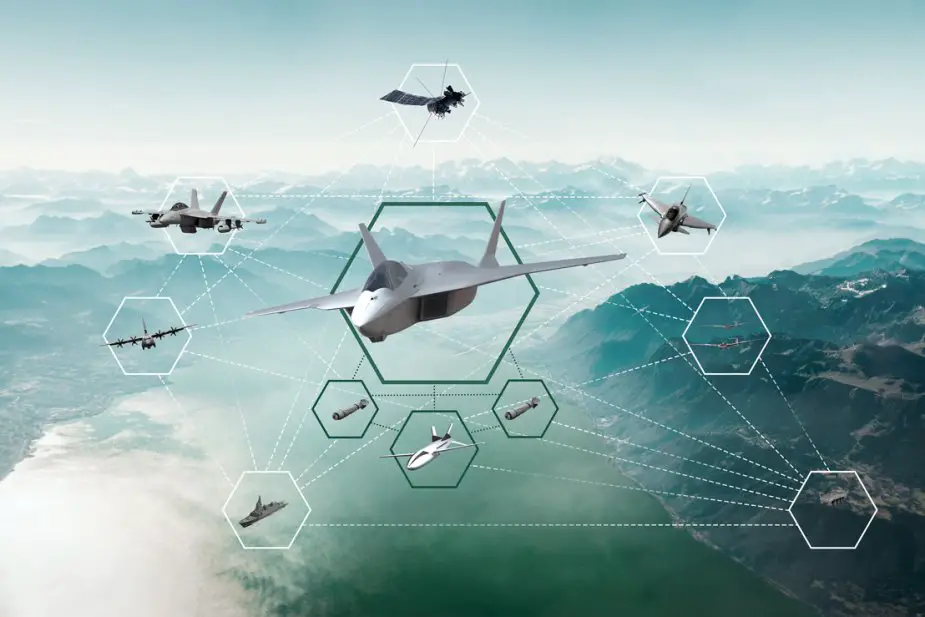According to an audition of the CEO of Dassault Aviation on May 24, 2023, Eric Trappier has expressed his opposition to the expansion of the FCAS (SCAF) program, which aims to develop future aircraft, to other countries.
Follow Air Recognition on Google News at this link
 Artist rendering of the future FCAS. (Picture source: Thales)
Artist rendering of the future FCAS. (Picture source: Thales)
Despite the mention of "expanding" the program by the French Minister of Defense, Sébastien Lecornu, Trappier strongly disagrees with the idea. He emphasizes the existing challenges faced by the three countries involved - France, Germany, and Spain - and warns that he will fight against any imposition of expansion.
During his recent appearance before the Senate's Committee on Foreign Affairs and Defense, Trappier provided detailed insights into the future deliveries of Rafale aircraft to the French military and provided updates on the progress of the FCAS project.
One area of concern raised by the senators was the reduction in the number of orders for the renowned Rafale aircraft, currently used by the French military.
Christian Cambon, the president of the committee, highlighted that the target number of Rafale aircraft for the air force is set to decrease from 185 to 137 by 2030. This reduction raised eyebrows among lawmakers.
The president expressed that the minister had explained that the adjustments aimed to prioritize coherence over quantity in order to enhance availability.
Senator Cédric Perrin, also part of the committee, remarked on the responsibility placed on the industry for program delays until 2035, questioning the industry's ability to meet production demands and accelerate production.
Trappier clarified the upcoming deliveries to the French military, taking into account the replacement of 12 aircraft sold to Greece and 12 used aircraft delivered to Croatia.
He mentioned that 13 aircraft are scheduled for delivery in 2023, followed by 13 in 2024, 12 in 2025, and 1 in 2026, which will fulfill the existing French aircraft orders.
These deliveries had experienced delays primarily due to budgetary constraints. Looking ahead, an order for 42 aircraft is expected to arrive in 2023, with the majority of deliveries slated to commence in 2029.
When discussing production capacity, Trappier acknowledged that they are capable of ramping up production, but it requires time to do so. Paradoxically, despite the presence of unemployment, industries are facing difficulties in recruiting skilled workers.
Regarding the FCAS project, Trappier provided an update on its development. The FCAS is envisioned as a sixth-generation fighter aircraft called the New Generation Fighter (NGF), which will operate alongside drones in a networked combat system referred to as the cloud.
Following significant tensions, including disputes over the role of the French aircraft manufacturer and industrial ownership, Dassault Aviation and Airbus reached an agreement in late 2022 to launch the project's initial phase, known as phase 1B.
This phase commenced earlier this year in their design office at Saint-Cloud, with the objective of flying a demonstrator. However, a contract for phase 2 is still pending.
While Trappier expresses enthusiasm about flying a demonstrator, he remains cautious about the project's future. He emphasized that they are currently in the preparation stage and are not yet at the point of developing an operational program.
Trappier suggests that a launch beyond the initially announced date of 2040 is more realistic, considering the time required for complex development processes.
Expanding the FCAS program to additional countries raises concerns for Trappier. With the project's initial focus on France, Germany, and Spain, the possibility of involving other nations is questioned.
Trappier believes that adding more countries to the program would complicate matters and reduce France's role in its development. He particularly emphasizes his opposition to involving Belgian companies, given their choice to purchase F-35 aircraft instead of participating in the Scaf program. Trappier argues against allocating work to Belgian firms and states that he will fight against any such imposition.
Furthermore, Trappier discussed the need to prolong the lifespan of the Rafale aircraft due to the extended development timeline of the Scaf project. He indicated that the Rafale is expected to remain operational for at least 30 years alongside the NGF.
To achieve this, Dassault Aviation plans to continue modernizing the Rafale aircraft beyond the F5 standard. Notably, Trappier mentioned that the F5 standard, initially scheduled for 2032, has been slightly delayed to 2035, which is after the military programming law's timeframe.
















